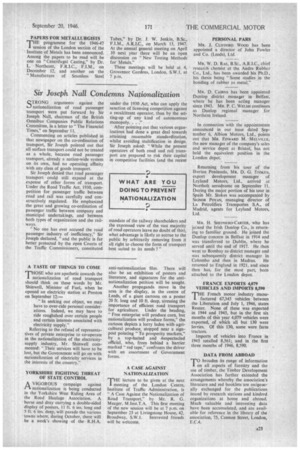Sir Joseph Nall Condemns Nationalization
Page 25

If you've noticed an error in this article please click here to report it so we can fix it.
QTRONG arguments against the 6-7 nationalization of road passenger transport were put forward by Sir Joseph Nall, chairman of the British Omnibus Companies Public Relations Committee, in a letter to "The Financial Times," on September 11.
Commenting on articles published in that newspaper on the co-ordination of transport, Sir Joseph pointed out that all surface transport could not be treated as a whole, because road passenger transport, already a nation-wide system on its own, had no operating affinity with any class of goods transport.
Sir Joseph denied that road passenger transport could still expand at the expense of other forms of transport. Under the Road Traffic Act. 1930, competition for passenger traffic between road and rail was carefully and constructively regulated. He emphasized the great and growing co-ordination of passenger traffic between company and municipal undertakings, and between both types of organization and the railways.
" No one has ever accused the road passenger industry of inefficiency," Sir Joseph declared, "and the public is far better protected by the open Courts of the Traffic Commissioners, constituted under the 1930 Act, who can apply the sanction of licensing competition against a recalcitrant operator, than by the setting-up of any kind of autonomous monopoly. . . ."
After pointing out that various organizations had done a great deal towards attaining reasonable standardization, whilst avoiding stultification in design. Sir Joseph asked: "While the present operators of both road and rail transport are prepared to risk their capital in competitive facilities (and the recent mandate of the railway shareholders and the expressed view of the vast majority of road operators leave no doubt of this), what advantage is likely to accrue to the public by arbitrarily removing from it all right to choose the form of transport best suited to its needs ? "




































































